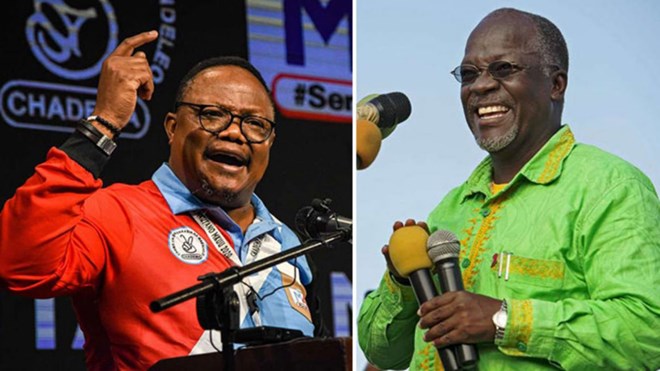
Friday September 11, 2020

It is now official: President John Pombe Joseph Magufuli and former legislator and assassination attempt survivor Tundu Antipa Lissu Mughway, will square off in October in a political battle to decide who gets to be president of Tanzania for the coming five years.
It is an unlikely contest, but it is very real. Magufuli (61) will be seeking a second and final term, and he will be hoping that these coming five years will afford him the space to complete a couple of mega projects that he has pegged his presidency on.
He wants to build a SGR railway from Dar es Salaam to the border with Rwanda; resuscitate the chronically ailing Air Tanzania; build a hydroelectric dam over a catchment area which will take up part of the world-renowned Selous game reserve, and make Dodoma effectively and efficiently Tanzania’s political capital.
He has the power of incumbency in his corner, in that he can point to the advanced stages of the constructions, and in a country where such grandiose schemes have a considerable allure, he rides on a winning ticket. Like all people who believe big things ‘bring development,’ many Tanzanian voters are seduced by such efforts.
From the other end of the spectrum, Tundu Lissu (52), a firebrand politician with a sharp tongue, pours scorn on these mega projects, stating that what the country needs is to build and enhance human capacity, not to build brick-and-mortar structures.
He faults the president for trampling on human rights, muzzling free expression and carrying out his projects outside parliamentary oversight.
Candidate Lissu is almost an impossible thought. Three years ago, a shocked Tanzania learned that he had been attacked by unknown assailants within parliamentary premises in broad daylight in Dodoma, hit by 16 bullets as he went for lunch. Lissu, who was left for dead by the shooters, has always maintained that state organs were involved in the attack, and the circumstantial evidence might suggest someone listen to him:
No one has ever been arrested for the shooting; the CCTV camera footage has never been released and the near moribund legislator was denied financial expenses for medical attention.
Whereas being shot several times does not give anyone a ticket to the State House, it is nigh impossible to deny that there will be sympathy votes cast for Lissu, at least by those who are horrified that brutal murder is becoming a political prop for those unable to stand on their arguments.
The line is thus drawn in the sand, and the contest couldn’t be sharper, although one has to consider other factors outside these two. CCM, the incumbent party, has been in power since Tanganyika’s independence in 1961 and since the union with Zanzibar in 1964.
Since the reintroduction of multiparty politics in 1992, opposition to CCM has ebbed and flowed, depending mainly on the strength of the opposition candidate pitted against it.
This strength will this time depend on whether the opposition will come together and front single candidates, from the presidential vote down to council level, something they have promised but may not be able to effect.
There appears to be only one other credible opposition candidate, and it is not clear if, and when, he plans to desist in favour of Lissu. That is ACT-Wazalendo’s Bernard Camillius Membe, a late defector from CCM and former Foreign Minister.
At lower levels it usually has been more complicated in many of the past elections, because at those levels too many people have invested money and aspirations to let go their ambitions without concrete incentives, which the opposition cannot easily offer. Likely at those levels, individuals in the opposition camp will mutually self-destruct, handing CCM easy victories in parliamentary and council elections.
The election at the end of October will also involve structures at the level of Zanzibar, where the veteran campaigner, Seif Sharif Hamad is throwing in his hat once again, having failed in his bid to be president of the Isles five times. He is now running on the ticket of ACT-Wazalendo.
Extreme measures
He has always complained that elections in Zanzibar have always been rigged against him, saying all along he has calmed down his followers, pleading with them not to take any extreme measures.
Now, he says he will not intercede with the young militants who may be moved to take actions of their choice if they feel they have been cheated out of an election again.
Seif’s warning needs to be taken seriously since some of his main complaints have been borne out by time. One such complaint was that the 2015 election was run by the Zanzibar Electoral Commission (ZEC), whose chairman, Jecha Salim Jecha, annulled the results that Seif claimed to have won and instead called a fresh election, which CUF boycotted and CCM won over 90 percent of the votes.
At the beginning of the current electoral process Jecha, who is now deceased, was a CCM aspirant. Unsettling news from Zanzibar suggests a large number of Seiff’s candidates there have been disqualified by ZEC, which could spell trouble.